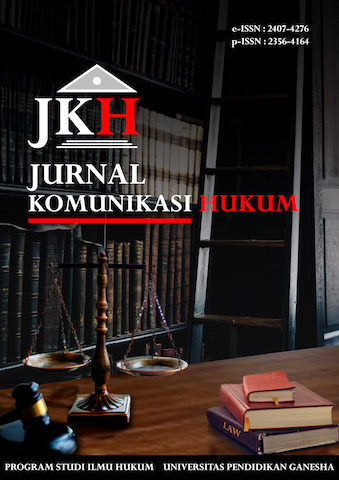RELASI PENYELENGGARAAN PERADILAN PIDANA YANG CEPAT, SEDERHANA DAN BIAYA MURAH TERHADAP PELAKSANAAN PIDANA CAMBUK DI NANGROE ACEH DARUSSALAM: KONSTRUKSI TERHADAP PEMBAHARUAN RUU KUHP
DOI:
https://doi.org/10.23887/jkh.v8i2.51179Abstract
Article 2 paragraph 4 of Law no. 48 of 2009 concerning Judicial Powers of Punishment states that trials are carried out in a simple, fast and low cost manner. This principle has been implemented in the implementation of the imposition of caning in Aceh. The implementation is in an open field and ends in 1 day. It is interesting to study from the principles of fast, simple, and low-cost justice. The execution of the caning sentence which ends in 1 day embodies the principle of a fast trial, carried out in the open field by wearing a certain size of rattan, showing a simple trial. The implementation also demonstrates the principle of low-cost justice. In the perspective of the Criminal Code Bill, the implementation of this punishment is based on living law and has been stated in the applicable law in Aceh, realizing the criminal objectives of prevention, fostering perpetrators, restoring balance, and resolving conflicts. Its rationality rests on the laws that live in Aceh, and embodies the principles of fast, simple and low-cost justice. Philosophically, this punishment is built on the basis of the Acehnese people's view of life which relies on philosophical values derived from Islamic law. Sociologically, caning has been around for a long time in Acehnese society. Juridically normative based on the 1945 Constitution, the implementation of caning reflects the law that lives in society as an embodiment of customary units that apply in Acehnese society as stipulated in Article 18 B.
Downloads
Published
How to Cite
Issue
Section
License
Authors who publish with this journal agree to the following terms:- Authors retain copyright and grant the journal right of first publication with the work simultaneously licensed under a Creative Commons Attribution License that allows others to share the work with an acknowledgement of the work's authorship and initial publication in this journal.
- Authors are able to enter into separate, additional contractual arrangements for the non-exclusive distribution of the journal's published version of the work (e.g., post it to an institutional repository or publish it in a book), with an acknowledgement of its initial publication in this journal.
- Authors are permitted and encouraged to post their work online (e.g., in institutional repositories or on their website) prior to and during the submission process, as it can lead to productive exchanges, as well as earlier and greater citation of published work (See The Effect of Open Access).
Authors who publish with this journal agree to the following terms:
- Authors retain copyright and grant the journal right of first publication, with the work [SPECIFY PERIOD OF TIME] after publication simultaneously licensed under aCreative Commons Attribution License that allows others to share the work with an acknowledgement of the work's authorship and initial publication in this journal.
- Authors are able to enter into separate, additional contractual arrangements for the non-exclusive distribution of the journal's published version of the work (e.g., post it to an institutional repository or publish it in a book), with an acknowledgement of its initial publication in this journal.
- Authors are permitted and encouraged to post their work online (e.g., in institutional repositories or on their website) prior to and during the submission process, as it can lead to productive exchanges, as well as earlier and greater citation of published work (See The Effect of Open Access).












